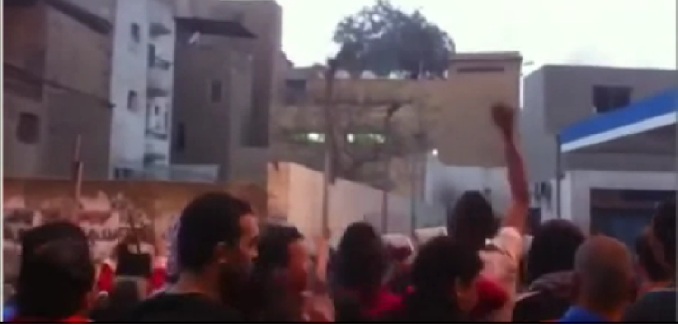
Six Egyptians have been killed and almost 100 injured over the last four days in sectarian violence of a kind that activists and analysts tell The Tower is unprecedented in modern Egypt.
Four Christians and a Muslim were killed in sectarian clashes in a Cairo suburb on Saturday. A Muslim mob subsequently attacked the Sunday funeral procession held for the four at Cairo’s Coptic Orthodox cathedral, leading to another death and scores of injuries. Mourners who took cover in the cathedral compound were attacked with rocks and Molotov cocktails. Sectarian tension has continued into Monday in the Egyptian capital and its surrounding areas.
Egypt’s 10-percent Christian minority has historically been subject to religious and economic discrimination. The situation has worsened since the 2011 ouster of Egyptian president Hosni Mubarak and his replacement by the Muslim Brotherhood-linked government of Mohammed Morsi, and there has been a massive Christian exodus from the country.
But Mina Rizkalla, a U.S.-based Coptic activist, told The Tower that the weekend’s violence was a severe escalation.
“Since the establishment of modern Egypt we have never seen attacks against Copts reach the Coptic Cathedral, where the Coptic Pope lives, and which Copts view as their safest and holiest place. The scenes of tear gas and shooting in the cathedral… [can't be] removed,” he said.
Rizkalla said that attacking the cathedral sent a “clear” message to Egypt’s Coptic community: “Leave or die.”
Egyptian media continues to describe the attackers as “unknown assailants.” Egypt’s Interior Ministry blamed the mourners for the violence and said the riot police intervened to stop it. That account is in tension with eyewitness accounts, which depict Muslim attacks in response to Coptic anti-government chants:
[Photo: TheFreeCopt / YouTube]
Four Christians and a Muslim were killed in sectarian clashes in a Cairo suburb on Saturday. A Muslim mob subsequently attacked the Sunday funeral procession held for the four at Cairo’s Coptic Orthodox cathedral, leading to another death and scores of injuries. Mourners who took cover in the cathedral compound were attacked with rocks and Molotov cocktails. Sectarian tension has continued into Monday in the Egyptian capital and its surrounding areas.
Egypt’s 10-percent Christian minority has historically been subject to religious and economic discrimination. The situation has worsened since the 2011 ouster of Egyptian president Hosni Mubarak and his replacement by the Muslim Brotherhood-linked government of Mohammed Morsi, and there has been a massive Christian exodus from the country.
But Mina Rizkalla, a U.S.-based Coptic activist, told The Tower that the weekend’s violence was a severe escalation.
“Since the establishment of modern Egypt we have never seen attacks against Copts reach the Coptic Cathedral, where the Coptic Pope lives, and which Copts view as their safest and holiest place. The scenes of tear gas and shooting in the cathedral… [can't be] removed,” he said.
Rizkalla said that attacking the cathedral sent a “clear” message to Egypt’s Coptic community: “Leave or die.”
Egyptian media continues to describe the attackers as “unknown assailants.” Egypt’s Interior Ministry blamed the mourners for the violence and said the riot police intervened to stop it. That account is in tension with eyewitness accounts, which depict Muslim attacks in response to Coptic anti-government chants:
Clashes erupted immediately after the service between the emerging mourners and a crowd outside the cathedral. It was unclear who started the violence. But later dozens of riot police with armored vehicles and tear-gas canons appeared to enter the fray on the side of crowds of young Muslim men who were throwing rocks and fire bombs at the mourners.The role played by Egyptian police has come in for particularly withering criticism:
In what seemed like a siege of the cathedral, tear-gas canisters fell inside the walls of its compound, sending gas into the sanctuary and two nuns running for shelter in a nearby loading dock. Later, some of the young civilians who had been attacking the cathedral switched to taunts, making lewd gestures involving the sign of the cross. The riot policemen made no attempt to stop them, either from throwing rocks toward the cathedral or insulting the Christians.
But Remon Wageh, a church worker, blamed what he called radical Muslims for the violence. “The minute the Christians loaded the coffins into cars after the service, a group of bearded radicals threw rocks at us,” he said. “The police just stood by watching, doing nothing,” he said. “They protected the radicals who were hiding behind a line of officers in the street outside the cathedral.” Police officers were not available to comment on the accusation. The interior minister later went to the scene at Mursi’s request to investigate but did not speak to the media.Video from the scene underscores the sectarian dimensions of the violence:


No comments:
Post a Comment